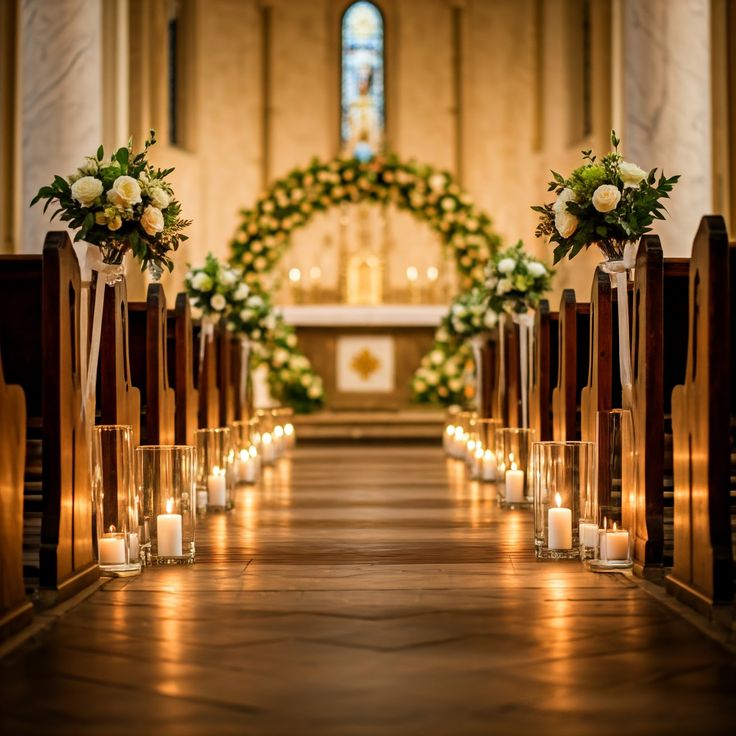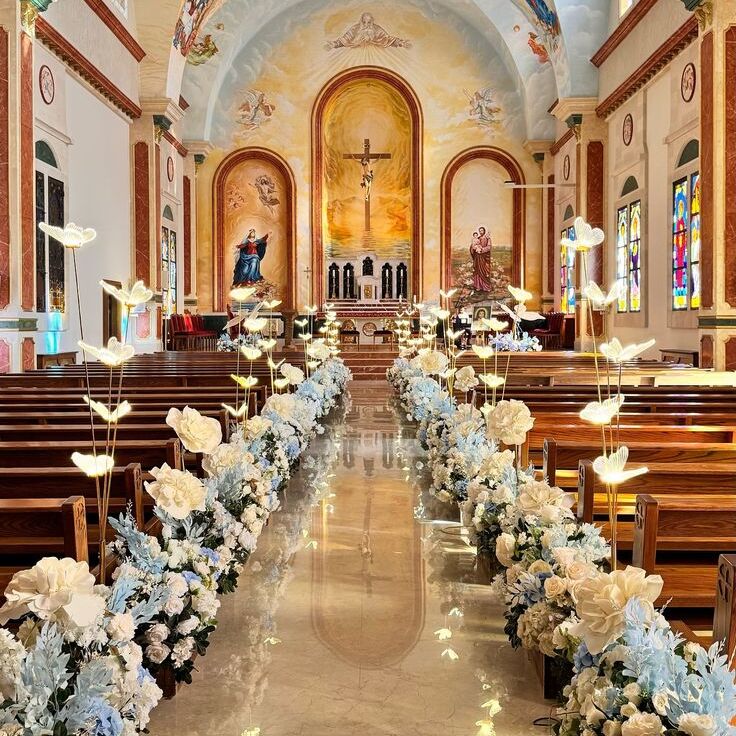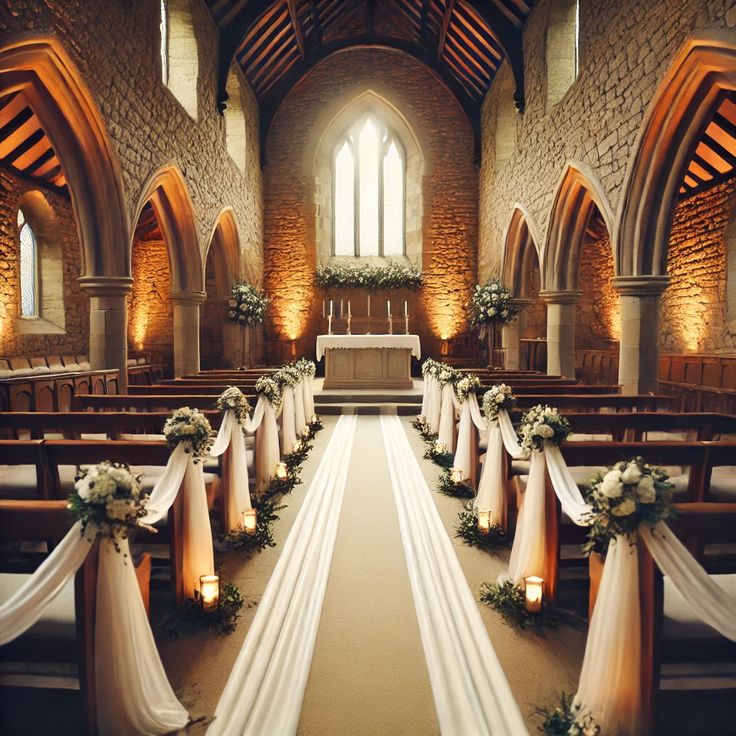Introduction to Church Wedding Costs
When planning your special day, considering the cost of a church wedding is crucial. It’s a beautiful option, steeped in tradition and meaning, but there are expenses involved. The price can vary, influenced by several factors, such as denomination, location, and size of the wedding. How much does a church wedding cost? Understanding these costs helps manage your wedding budget better.
In this intro, we’ll explore the basics of church wedding costs to help you prepare. Remember, while there’s a price tag, there are also tips and tricks to trim the expenses. Whether it’s an Anglican or Roman Catholic church, each has its own set of fees and donations. Additional costs can pop up, so factor them in early on. And lastly, we’ll look at how to save on these costs, so your church wedding is as affordable as it is memorable.

Key Factors Influencing Church Wedding Expenses
How much does a church wedding cost? When planning a church wedding, several factors impact the overall costs. Keep these in mind:
- Church Size and Location: A larger church or one in a high-demand area may charge more.
- Denomination: Anglican and Roman Catholic churches may have different fee structures.
- Membership Status: Being a member of the church often comes with cost benefits.
- Ceremony Details: The complexity of the ceremony can add to the cost with added decor, music, and more.
- Officiant Donations: Expect to pay a stipend to the priest, minister, or officiant.
- Additional Services: Organists, bell ringers, and extra staff can increase expenses.
- Time of Year: Peak wedding seasons may result in higher fees.
- Church’s Policies: Some churches have mandatory donations or suggested fees.
- Additional Rentals: Use of church facilities for the rehearsal or reception may incur extra charges.
Understanding these factors helps pinpoint where costs may rise, allowing couples to make informed decisions and prioritize their budget accordingly. It’s important to discuss these elements with the chosen church for detailed planning and to avoid unforeseen expenses.
Cost Breakdown of a Church Wedding Ceremony
Understanding the cost breakdown for a church wedding can help manage your budget. Here’s what to expect:
- Venue Fee: This is often the largest cost. Churches might charge a flat rate or a donation.
- Officiant Donation: A standard expense for the person leading the ceremony. This can vary in amount.
- Music and Musicians: Hiring organists or choirs adds atmosphere but increases costs.
- Decor: Flowers and other decorations will vary based on your taste and the church’s policies.
- Preparation Programs: Some churches require pre-marriage classes with associated fees.
- Administrative Costs: Paperwork and scheduling may have separate charges.
- Rehearsal and Reception: If these occur in the church, there might be extra fees.
- Additional Personnel: Altar servers or vergers could come with their own costs.
Knowing these details will help you craft a clearer picture of what to budget for. Remember to ask the church for specifics, as prices can differ widely. Always keep room in your budget for unexpected expenses.
Comparing Costs: Anglican vs. Roman Catholic Church Weddings
When choosing between an Anglican or Roman Catholic church wedding, understanding the cost differences is crucial. Let’s delve into what you can expect financially for each denomination.
Anglican Church Wedding Costs
Anglican churches typically charge a fee for weddings, which may include the vicar’s service, church use, lighting, heat, and administration. As of 2024, costs can max out at ?539 for local parish weddings or ?641 for non-local ones. Remember, this doesn’t cover the marriage license, which you’ll need to arrange separately.
Roman Catholic Church Wedding Costs
Roman Catholic churches do not charge a set fee for weddings but do suggest a donation, usually around ?150. This helps with church upkeep and maintenance. Note that one partner must be Roman Catholic and provide six months’ notice for a church wedding. Also, Roman Catholic weddings require specific steps before marriage, which may involve extra preparation costs.
Each church type may entail additional costs for music, bell ringing, and heating. These can vary, so it’s wise to inquire with your chosen church. Understanding these cost structures helps you make an informed decision and aids in budget planning for your big day.
Additional Costs to Consider When Planning a Church Wedding
When setting your church wedding budget, consider every possible expense. Here are some additional costs you might encounter:
- Altar Servers or Liturgical Assistants: These helpers ensure your ceremony runs smoothly. You may need to compensate them.
- Organists and Musicians: Live music beautifies the ceremony but comes at a cost. Budget between $300 and $900.
- Steeples and Coverings: Some churches charge for ringing steeple bells. Costs can start at $100.
- Dress Code Compliance: For churches with strict dress codes, additional attire like shawls may be necessary.
- Ceremony Ritual Supplies: Items like unity candles or sand kits for rituals cost between $30 and $100.
- Decoration: Adding personal touches with flowers or candles can increase costs. Decide how much to spend on decor.
Understanding these extra costs helps avoid surprises. Plan your budget with these in mind to ensure a smooth ceremony.
Church Wedding Budget Tips: How to Save on Expenses
Planning a church wedding doesn’t have to strain your finances. Here are some budget tips to help you save:
- Seek Membership Discounts: If you’re a member of your church, ask about discounts. Many churches offer reduced rates for regular attendees.
- Limit Guest Numbers: A smaller guest list cuts costs on invitations, catering, and more.
- Opt for Off-Peak Seasons: Marrying outside of peak wedding seasons can slash venue costs.
- DIY Decor: Create your own decor with friends and family. It adds a personal touch and saves money.
- Repurpose Decor: Use ceremony flowers for reception tables later. It’s smart and cost-effective.
- Consider a Donation-Based Venue: Some churches only ask for a voluntary donation. This can significantly lower your venue fee.
- Find a Local Musician: Hiring a local musician or asking a talented friend to play can be cheaper than professional bookings.
- Streamline the Ceremony: A simple ceremony can reduce the need for costly extras.
- Explore Package Deals: Some churches offer packages that include venue, officiant, and music for one price.
By considering and applying these tips, you can enjoy your special day without the heavy financial burden.
The Role of Donations in Church Weddings
Donations play a crucial role in church weddings. They often support the church’s maintenance and activities. Donations vary by church and your relationship to it. Members may pay less due to existing agreements. Non-members might be asked for a fixed donation. This helps cover costs like clergy, utilities, and upkeep. Each denomination may suggest different donation amounts. For Roman Catholic weddings, a typical donation is about ?150. This goes towards church upkeep. Donations can be mandatory or voluntary, based on church policies. Always check with your church about its donation practices. This ensures your budget aligns with expected contributions.
Planning and Managing Your Church Wedding Budget
When planning a church wedding, it’s vital to manage your budget carefully. This means being aware of all expected and potential costs to ensure your special day is not only beautiful but also feasible financially. Here’s a summary of key steps to take when planning and managing your church wedding budget:
- Review Costs Regularly: Keep a close eye on expenses to avoid surprises. Adjust your plan if costs shift.
- Prioritize Expenses: Decide what matters most to you. Spend on significant elements and cut back elsewhere.
- Track Every Cost: Record every expense, no matter how small. It adds up and affects your overall budget.
- Establish a Contingency Fund: Set aside extra cash for unforeseen costs. It ensures you’re prepared for anything.
- Stay on Top of Payments: Pay deposits on time. Keeping track helps you manage the budget efficiently.
- Seek Advice: Talk to couples who had church weddings. Their experience could provide valuable insights.
- Consider Non-Monetary Contributions: Have friends or family help with music or decor as their wedding gift.
- Negotiate When Possible: Don’t be afraid to discuss costs with vendors. Sometimes, there’s room for negotiation.
- Use Budgeting Tools: Leverage budget planners or apps. They make tracking expenses easier.
Proactively managing your church wedding budget involves continuous review and adjustment. With the right approach, you can ensure that your wedding is not only a blissful experience but also one that doesn’t leave you burdened with unexpected debt.

